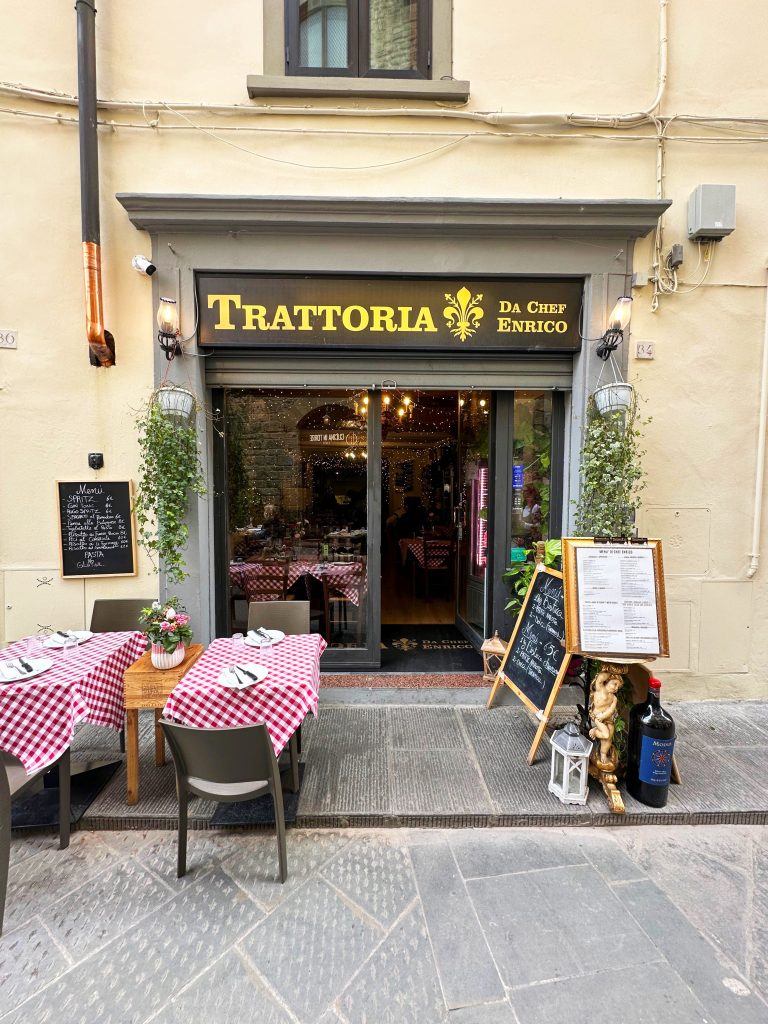By Elsa Vellone | University of Rochester | ISI Florence Spring 2024
In America, we are used to everything big: from Coca-Cola bottles to plates of food to stores; specifically, department stores. A walk into Target will get you prescriptions, groceries, home goods, electronics, photos, clothes, cosmetics, and basically anything else you can think of. As Americans, we are used to walking into almost any store and being able to buy a large array of goods, but this concept changes drastically in Italy when stores are specific to a type of item. Most notably, you can see this in Italian store names that end in ia.
We never have to think about which store to go buy school supplies, because every grocery store and department store will have them. Similarly, we never have to think about where to buy things like batteries, hair brushes, packing tape, or most other miscellaneous items because our stores offer such a large selection of products that whatever you’re looking for will likely be at a Target, Walmart, CVS, or Home Goods.
In Italy however, everything seems to shrink in size in comparison to America: all the way from street sizes to packaging, drinks, and most notably, stores, including restaurants. In America, the word restaurant covers an array of different places to eat, ranging from high-end to fast food, and including almost any type of food. In Italy however, ‘restaurant’ is not an umbrella term to refer to all types of food. Instead, there are pizzeria, osteria, friggitoria, and trattoria to name a few. A pizzeria will exclusively sell you pizza, while an osteria and trattoria are more typical restaurants with menus including first and second-course dishes; a friggitoria on the other hand sells fritti, or fried food.

In regards to food, Americans tend to shop at local supermarkets or bakeries for everything. In Italy however, if you want to buy high-quality meats or fish, you can go to a macelleria, salumeria, or pescheria; a macelleria is a typical butcher shop, while a salumeria deals specifically with cured meats; A pescheria on the other hand sell pesce, or, fish; A pasticceria is where you buy pastries, cakes, and cookies; a panetteria is where you buy pane, or bread; a gelateria sells gelato; and a cornetteria sells cornetti or, croissants.
In America when shopping for clothes or miscellaneous goods we tend to gravitate toward department stores. In Italy, however, there is a store for almost every specific type of item: A farmacia is a typical Italian pharmacy that sells very few items besides medications. Grocery stores on the other hand do not sell medications like they do in America, and drug stores such as RiteAid, or Kinneys do not exist. A libreria sells libri, or books and the like; a cartoleria sells carte or paper goods (and will sometimes print photos); a profumeria sells profumi or, perfumes; a gioielleria sells gioielli or, jewelry; and a peletteria sells leather goods such as bags or jackets. The most complicated of all stores from an American point of view, however, would be a tabaccheria.
Tabaccherie (in the plural form, ia becomes ie) are tobacco shops. However, they can also be bars, meaning they sell coffee and alcohol in addition to baked goods and sometimes sandwiches. They are where you can buy lottery tickets, where you can print documents, pay your phone bill, buy bus tickets, pay for money orders, (called marche da bollo or versamenti) buy tickets for sporting events or concerts, buy water, perfume, candy, and the list goes on. Oh, and don’t forget that they also sell a wide range of tobacco products as per their name.
Although sometimes having a specific store for different items can be frustrating –especially when you are in a different country– it is part of the experience. There is beauty in experiencing life as a local, even if that means taking a little more time to do your shopping in the busy lives we have. It slows things down, and it allows you to meet people and have conversations that you wouldn’t have when shopping in big stores. Another advantage of this small shopping experience is that due to the specificity of the store, owners can also offer a different level of knowledge of the products you are buying, as well as specific help or guidance that you could never get in a big, chain department store.
For me, this has been a great part of being in Italy: I shop once a day, or once every other day, and I go to markets and local shops as much as I can. Asking people about their goods not only offers Italian language practice, but vendors are always eager to start a conversation, whether it’s about the product they are selling, the history of their shop, or when buying food, what you plan on cooking, and what recipes you will use. There seems to be a different, more profound relationship you make with Italian vendors you frequent often than you would be able to make in America. These interactions are all a great part of experiencing Italian culture and getting to live like a real local and are highly valuable when wanting an ‘authentic’ study abroad experience.
